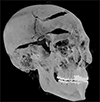February 17, 2021 Scientists now say that a pharaoh known as "The Brave" was the victim of a battlefield execution. Seqenenre Tao II, who ruled southern Egypt from about 1558 B.C. to 1553 B.C., led his army into battle against the Hyksos, who ruled Egypt during what historians called the Second Intermediate Period. The king died fighting alongside his soldiers. 
Scientists in the 1960s had used X-rays to examine the pharaoh's mummy and had found evidence of head wounds, including on his face. The archaeologists who found the pharaoh in 1886 noticed the skull wounds and put forward a theory of battlefield death or perhaps even palace coup. They also reported a bad smell when they unwrapped the mummy and posited that the cause of that was a hasty embalming, performed perhaps while the dead king was still on the battlefield. More recent examinations using cutting-edge technology revealed the exact nature of those head wounds, scientists today say. A combination of CT scanning, X-rays, and 3D imaging produced an accurate depiction of the wounds that killed Seqenenre II: cuts around the cheeks and eyes, a stab wound In examining the wounds, the archaeologists also studied daggers, an axe, and a spear known to have been used by the Hyksos in their battles with the Egyptians. Finding correlation, they concluded that Hyksos warriors bound the king and then executed him using a variety of weapons. Ancient sources say that the battle was the result of a spat between Seqenenre Tao II and Apophis, the Hyksos king at the time. Apophis apparently complained that he could not sleep in his capital city, Avaris, because the hippopotamuses in a sacred pool in Thebes, 400 miles away, were making too much noise. The Hyksos king, so the story goes, demanded that the pool be destroyed, which the pharaoh considered insulting enough to provoke a battle. The pharaoh's son Ahmose I had greater success against the Hyksos, defeating them and restoring unified Egyptian rule with the Eighteenth Dynasty. |
|
Social Studies for Kids
copyright 2002–2024
David White



 at the base of the skull, and a huge indentation in his face. Archaeologists led by Cairo University radiology professor Sahar Salim (right) and former head of Antiquities Zahi Hawass found evidence that the pharaoh had his hands tied behind his back in addition to being dealt a number of vicious blows to the head.
at the base of the skull, and a huge indentation in his face. Archaeologists led by Cairo University radiology professor Sahar Salim (right) and former head of Antiquities Zahi Hawass found evidence that the pharaoh had his hands tied behind his back in addition to being dealt a number of vicious blows to the head.
